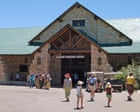
In recent days, nature has reminded us of its unpredictable power through a series of challenging events across different regions. Among these occurrences, the historic Grand Canyon Lodge on the North Rim has succumbed to the fury of wildfires, and search efforts continue for those missing amid heavy rains and subsequent flooding in Texas. Simultaneously, the heat in southern Portugal brings attention to potential fire hazards, underscoring the necessity for preparedness and resilience.
The beloved Grand Canyon Lodge, nestled within the stunning North Rim of the Grand Canyon National Park, regrettably has been engulfed by wildfires sweeping the area. These fires have thus far consumed over 45,000 acres, and park officials have decided to close access for the season to ensure visitor safety. Ed Keable, the park superintendent, confirmed in a recent meeting that this cherished landmark, along with several other structures including the visitor center and essential facilities, were lost to the blaze. This fire serves as another poignant reminder of the intense and often destructive force of nature, prompting a sustainable approach to rebuilding and conservation efforts.
While the national park in Arizona battles flames, the state of Texas faces its own natural trial with unprecedented floods. Having initially started with flash flooding on July 4, the region around the Guadalupe River continues to bear the brunt of heavy downpours. Up to 160 individuals remain unaccounted for, despite the ongoing rescue operations that have been momentarily paused due to incessant rains. The community and local authorities are working diligently to locate missing individuals and provide relief, embodying a spirit of unity and perseverance amid adverse conditions.
In another part of the world, the southern region of Portugal moves under a watchful eye as the Instituto Português do Mar e da Atmosfera (IPMA) issues warnings for extreme heat. Districts such as Bragança and Évora are identified as high-risk zones for potential fires due to current weather patterns. Local government and authorities are mobilizing resources to address these warnings, emphasizing precautionary measures to safeguard lives and properties in these vulnerable areas.
These recent events serve as compelling reminders of the unpredictable and varied challenges posed by nature. The loss of the Grand Canyon Lodge pulls at the heartstrings not only for its historical significance but also as a wake-up call to the importance of fire management practices. Meanwhile, the flood situation in Texas highlights the pressing need for community preparedness, active search, and rescue operations, which are essential components of emergency response strategies.
Amidst adversity, the power of community and the innate human capacity for resilience shine through. Residents and officials in Arizona, Texas, and Portugal are demonstrating effective collaboration and a shared resolve to manage the effects of these natural calamities. As we navigate these challenges, mindful action and compassionate efforts become pivotal in healing and rebuilding affected areas.
In these times, we are called to reflect on the delicate balance of coexisting with the natural world. Each event underscores the ongoing need for environmental consciousness and proactive dialogue about climate adaptation strategies. Learning from these experiences will hopefully guide us toward a future where we are better equipped to both minimize risks and enhance our capabilities to respond to nature’s unpredictable turns.
Ultimately, whether it involves preserving the integrity of cherished landmarks like the Grand Canyon Lodge, maintaining safety amid flooding threats in Texas, or ensuring vigilant fire prevention in Portugal, these are all reminders that concerted and deliberate efforts are crucial. Through informed planning, community solidarity, and an unwavering commitment to safety and environmental stewardship, we can hope to face future challenges with optimism and resolve.
Source: {link}
